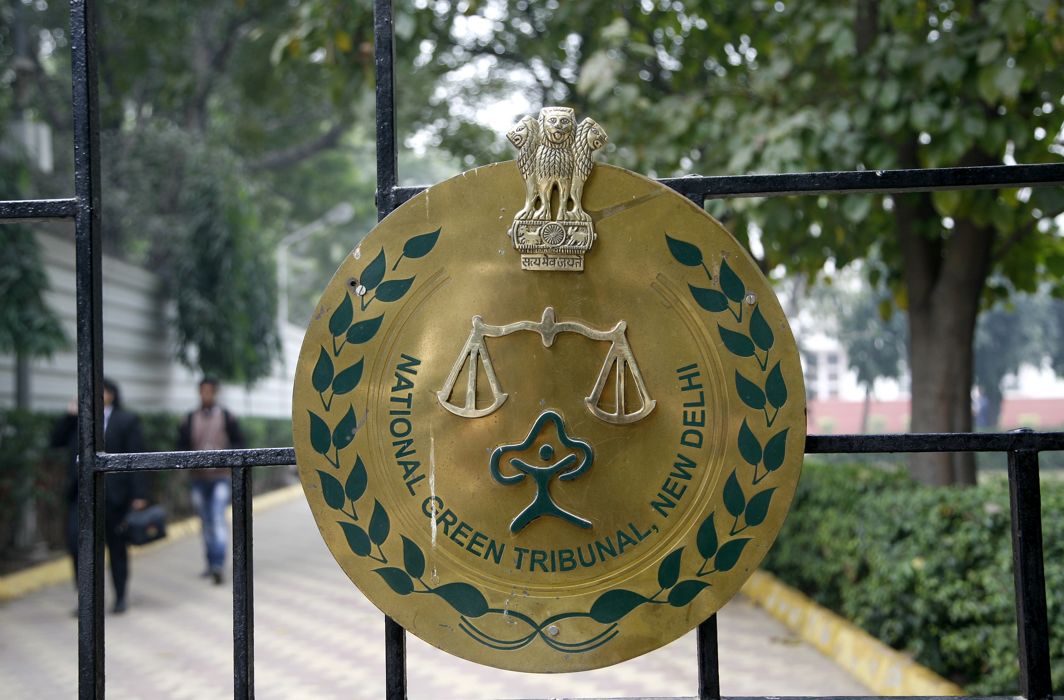The National Green Tribunal’s Principal Bench has disposed of the application seeking directions against illegal sand mining in the Godavari-Krishna river beds and free distribution of sand while stating that the issue of free distribution of sand in violation of Article 14 of the Constitution is beyond our jurisdiction and the said issue may be raised at an appropriate forum, if so desired.
The bench comprising of the Chairperson Justice Adarsh Kumar Goel, Justice Sudhir Agarwal, Justice M. Sathyanarayanan, Justice Brijesh Sethi, and expert member Dr. Nagin Nanda, considered the issue whether what is termed as ‘dredging’ in Godavari-Krishna river beds and its tributaries in the State of Telangana by the State Authorities is illegal mining, as alleged by the applicant.
The main surviving grievance of the applicant is that in the name of desiltation, sand mining is being done without mandatory environmental clearance, to provide free sand to the construction companies. Sand mining is said to be taking place at various places including in District Guntur, Andhra Pradesh, as reported in the Deccan Chronicle newspaper dated 18.02.2017. In the State of Telangana, sand is being mined illegally from Godavari and Krishna Rivers. The same is booked online at the rate of Rs. 9000/- per truck. In Hyderabad, it is sold at the rate of Rs. 45000/- per truck. The State of Telangana is allotting such sand to private contractors for diverting the same to black mafia. Transportation results in accidents and air pollution.
The Tribunal had on 23.05.2019, sought the factual and action taken report about the current status of the ground situation by a Committee comprising of CPCB, Telangana State PCB and SEIAA, Telangana. On 14.02.2020, the Tribunal Considered the matter and observed, “The above reports need to be independently evaluated and validated in view of conflicting versions. For this purpose, we constitute an Expert Committee comprising Members of Expert Appraisal Committee (EAC) on the subject of the MoEF&CC, nominees of the CPCB, IIT Roorkee, and the Indian School of Mines, Dhanbad. The nodal agency will be the CPCB for coordination and compliance. The Committee will be entitled to seek assistance from any other expert or agency. The State PCB may also render such assistance as may be sought. The applicants will be free to give their view point/submissions to the CPCB within two weeks. The CPCB will provide all documents to the members of the Committee.”
Later, the CPCB submitted its report after a meeting held with Telangana State Mineral Development Corporation (TSMDC) and the State PCB which forms the main basis of the CPCB, wherein it had recommended;
In future whenever the barrages are taken for desiltation, TSMDC shall re-ascertain the quantity of silt deposits. Bathymetric survey of reservoir at intervals of 500m can be carried out biannually, and update elevation capacity curve of reservoir for quantification of siltation. This will help in quantifying desilting of sediments for restoration of design capacity of reservoir.
The committee visited the Medigedda sand stockyard which is 100 hectares which as on the date of inspection contained 4 lakh m3 (as reported by TSMDC officials) in a private land taken on lease. The committee recommends that the TSMDC have to submit closure plans for all the stock yards enabling it for agriculture use again once the stocks are cleared. Reclamation of land for agriculture.”
Read Also: Madras High Court tells Tamil Nadu govt to provide cash relief to all transgenders
The counsel for the applicant submitted that the report of the TSMDC is self-serving. There is no mention of compliance of directions of the Hon’ble Supreme Court in Deepak Kumar v. State of Haryana & Ors., Sustainable Sand Mining Guidelines, 2016, Sustainable Sand Mining Guidelines, 2020 and directions of this Tribunal dated 26.02.2021, National Green Tribunal Bar Association v. Virender Singh (State of Gujarat) on the subject. It is further submitted that giving sand free to private parties is against norms for distribution of State largess and loss to the revenue of the State.
The Tribunal said that “apart from compliance of the recommendations of the Committee by the State of Telangana and its authorities, mandate of law laid down in Deepak Kumar v. State of Haryana & Ors. and Sustainable Sand Mining Guidelines issued by the MoEF&CC under the EP Act and safeguards required to be adopted in terms of order of this Tribunal dated 26.02.2021, National Green Tribunal Bar Association v. Virender Singh (State of Gujarat) may be followed. The issue of free distribution of sand in violation of Article 14 of the Constitution is beyond our jurisdiction and the said issue may be raised at appropriate forum, if so desired.”


